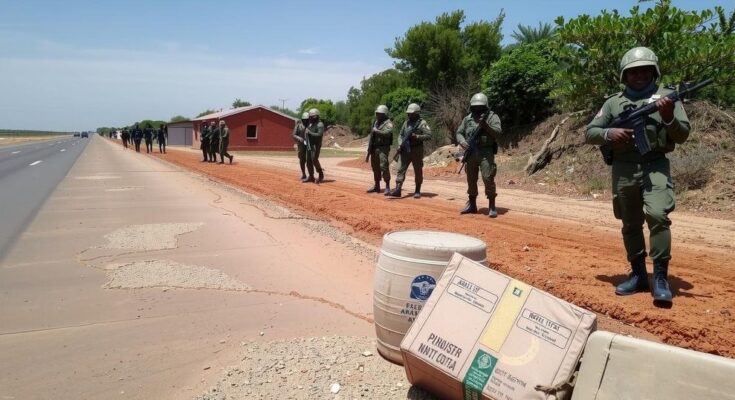South Africa has fortified its border with Mozambique amid violent protests following disputed election results, leading to over 260 deaths. The unrest has forced thousands to flee into Malawi, affecting regional stability and security. South Africa is engaging in diplomatic efforts to restore order and safety in Mozambique, which is grappling with significant unrest post-election.
South Africa has heightened security measures along its border with Mozambique amid ongoing protests in the latter nation that have led to civil unrest and significant loss of life. Statements from South Africa’s National Joint Operations and Intelligence Structure (NATJOINTS) indicate that the increased patrols aim to deter opportunistic crime while maintaining regional security. The unrest in Mozambique is rooted in the recent presidential election results, which the opposition claims were manipulated in favor of the ruling party, Frelimo. The electoral authority’s declaration of Daniel Chapo’s victory triggered violent demonstrations that have persisted for weeks, resulting in over 260 fatalities.
The violence has also led to considerable displacement, with many fleeing to neighboring Malawi, adversely affecting fuel imports to that country. The South African government is actively cooperating with Mozambique through diplomatic channels to address the crisis, aiming for a peaceful resolution and enhanced stability. Following the escalation of violence, South Africa temporarily closed its Lebombo border crossing due to safety concerns, reinforcing the importance of effective communication between the two nations. Furthermore, on a diplomatic note, President Cyril Ramaphosa dispatched a special envoy to Mozambique to engage in discussions regarding the political turmoil threatening regional stability.
Amidst fears stemming from the intense protests, where some fundamental human rights have been undermined due to police actions against civilians, it is evident that both South Africa and Mozambique are working towards sustained peace in the region. The burgeoning crisis underscores the complexities of electoral integrity and its physical ramifications on neighboring security, calling into question the efficacy of political systems in the dual nations.
The events surrounding the protests in Mozambique began after the electoral authority awarded Daniel Chapo of the ruling Frelimo party a decisive victory in the recent presidential elections. Opposition claims of electoral fraud led to heightened tensions and unrest. The resultant protests, marked by violent clashes, have sparked fears of a humanitarian crisis, particularly with a reported exodus of displaced individuals to neighboring Malawi. This situation illustrates the relevance of maintaining stability in the Southern African region, particularly in light of the interdependence of its countries. The attempted escape of prisoners during this period further complicates the security dynamics between Mozambique and South Africa.
In conclusion, the escalation of protests and violence in Mozambique has triggered a pronounced response from South Africa in the form of enhanced border security measures. The humanitarian implications of this unrest emphasize regional instability, as evidenced by the influx of refugees into Malawi. Continued diplomatic efforts between both South Africa and Mozambique remain critical to restoring peace and addressing the underlying political issues that have precipitated this turmoil. Without sustained communication and cooperation, there remains a risk of further deterioration in the region.
Original Source: www.aa.com.tr




